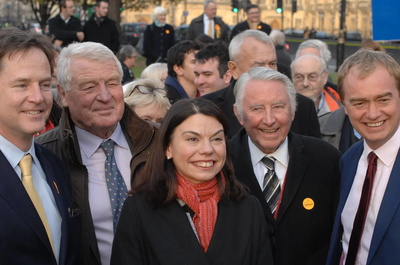Lib Dems must learn lesson of Iraq when it comes to Brexit campaigning

Liberal Democrats pull off shock by-election victory on a massive swing in a London Parliamentary by-election dominated by foreign policy issues. All sounds rather familiar… for what was Sarah Olney, Richmond Park and Brexit in 2016 has echoes of Sarah Teather, Brent and Iraq in 2003.
In that parallel are some important lessons for the Liberal Democrats, because taking the long view back over the first decade of this century it is hard to see what the eventual electoral benefit was to the party of its distinctive and popular position on Iraq.
Plot the graph of Liberal Democrat party membership totals, and you don't see a sustained Iraq boost. At best you can argue that a decline was halted for a couple of years. Same too for the strength of the party's local government base. Plot the proportion of councillors who were Liberal Democrat and you see a slight twitch upwards but no sustained Iraq boost, and the twitch then untwitched. Iraq occurred during a decade of flatlining in the party's local government base, with the party in 2000 having 20.07% of all councillors and in 2009 19.72%, with the peak at 21.52% in 2005. Even the 2005 general election - the party's best result in terms of seats - was followed by a widespread sense of disappointment across all parts of the party that the gains (+11) were only just in double figures.
What then can the Liberal Democrats learn from this so that this time a foreign policy issue (Brexit) does turn into a sustained and significant boost for the party?
First, if you want a stronger party you have to give real priority to growing membership and integrating this into all your plans. On that, signs are much more promising this time round, with recruitment plans closely integrated with wider party work - and indeed over 1,200 people joining the party since Sarah Olney's victory (many, judging by comments online, from Labour).
Second, national issues should lead to national campaigning. Such campaigning increases the chances of the party securing its policy objectives - and also provides the opportunity to accumulate data and email addresses about a huge extra number of people who can then be won over as regular supporters for future elections.
But when it came to Iraq even as simple a campaigning idea as running an online petition was vetoed from on high (I know - I was the HQ staffer suggesting one). National campaigning then was taken to mean get the party leader on the TV, have banners at one march and really not very much else.
During the last Parliament, things were not much better with very little campaigning involving members to achieve national objectives in the sense that a pressure group or NGO would recognise. The jury is still out on whether the party will get that right this time - though the new Director of Campaigns is a promising sign.
Third, national campaigning leads to attracting the support of a very disparate group of people who are massively motivated by one issue but may well not share that much with the party on other issues. In particular, Iraq led to an infusion of support which came from people who were many things but were not liberals. As I wrote in the Liberal Democrat Newswire #86, that produced a very brittle coalition of support which was bound to come unstuck at some point.
The lesson? You need a clear sense of what the party stands for beyond 'we disagree with the government on the big foreign policy issue of the day'. And then you need to consistently promote that to win over those who have been attracted to the party to get them to buy-in to the wider party vision too. The risk is that the party cheers the election of a Sarah, banks the goodwill, speculates about the next possible winnable by-election and thinks it just needs to continue as before.
Success requires a different approach. Which of course is where my favourite core votes topic comes up… as set out in the newly updated version of the How to rebuild the Liberal Democrats pamphlet.